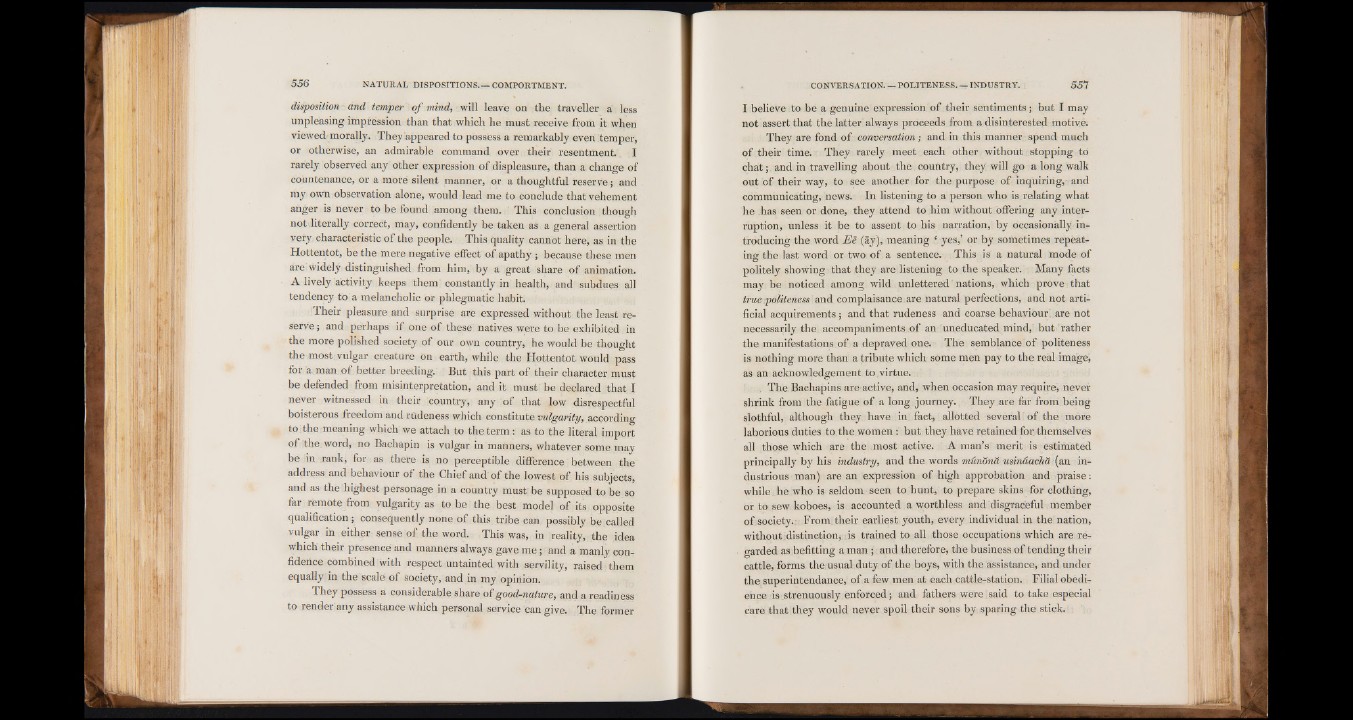
5 56 NATURAL DISPOSITIONS COMPORTMENT.
disposition and temper of mind, will leave on the traveller a less
unpleasing impression than that which he must receive from it when
viewed, morally. They appeared to possess a remarkably even temper,
or otherwise, an admirable command over their resentment. I
rarely observed any other expression of displeasure, than a change of
countenance, or a more silent manner, or a thoughtful reserve; and
my own observation alone, would lead me to conclude that vehement
anger is never to be found among them. This conclusion though
not .literally correct, may, confidently be taken as a general assertion
very characteristic of the people. This quality cannot here, as in the
Hottentot, be the mere negative effect of apathy ; because these men
are widely distinguished from him, by a great share of animation.
A lively activity keeps them constantly in health, and subdues all
tendency to a melancholic or phlegmatic habit.
Their pleasure and surprise are expressed without the least reserve;
and perhaps if one of these natives were to be exhibited in
the more polished society of our own country, he would be thought
the most vulgar creature on earth, while the Hottentot would pass
for a man of better breeding. But this part of their character must
be defended from misinterpretation, and it must be declared that I
never witnessed in their country, any of that low disrespectful
boisterous freedom and rudeness which constitute vulgarity, according
to the meaning which we attach to the term : as to the literal import
of the word, no Bachapin is vulgar in manners, whatever some may
be in rank, for as there is no perceptible difference between the
address and behaviour of the Chief and of the lowest of his subjects,
and as the highest personage in a country must be supposed to be so
far remote from vulgarity as to be the best model of its opposite
qualification; consequently none of this tribe can possibly be called
vulgar in either sense of the word. This was, in reality, the idea
which their presence and manners always gave m e; and a manly confidence
combined with respect untainted with servility, raised them
equally in the scale of society, and in my opinion.
They possess a considerable share of good-nature, and a readiness
to render any assistance which personal service can give. The former
CONVERSATION. — POLITENESS. — INDUSTRY. 5 57
I believe to be a genuine expression of their sentiments; but I may
not assert that the latter always proceeds from a disinterested motive.
They are fond of conversation; and in this manner spend much
of their time. They rarely meet each other without . stopping to
chat; and in travelling about the country, they will go a long walk
out of their way, to see another for the purpose of inquiring, and
communicating, news. In listening to a person who is relating what
he .has seen or done, they attend to him without offering any interruption,
unless it be to assent .to his narration, by occasionally introducing
the word Ee (ay), meaning ‘ yes,’ or by sometimes repeating
the last word or two of a sentence. This is a natural mode of
politely showing that they are listening to the speaker. Many facts
may be noticed among wild unlettered nations, which prove that
true politeness and complaisance are natural perfections, and not artificial
acquirements ; and that rudeness and coarse behaviour’ are not
necessarily the accompaniments of an uneducated mind, but rather
the manifestations of a depraved one. The semblance of politeness
is nothing more than a tribute which some men pay to the real image,
as an acknowledgement to .virtue.
The Bachapins are-active, and, when occasion may require, never
shrink from the fatigue of a long, journey. They are far from being
slothful, although they have in fact, allotted several of the more
laborious duties to the women: but they have retained for themselves
all those which are the most active. A man’s merit is estimated
principally by his industry, and the words múnontí usináachd (an industrious
man) are an expression of high approbation and praise:
while he who is seldom seen to hunt, to prepare skins for clothing,
or to sew koboes, is accounted a worthless and disgraceful member
of society.: From their earliest,youth, every individual in the nation,
without distinction, is trained to all those occupations which are regarded
as befitting a man ; c and therefore, the business of tending their
cattle, forms the usual duty of the boys, with the assistance; and under
the superintendance, of a few men at each cattlé-station. Filial obedience
is.strenuously enforced; and fathers were:said to take especial
care that they would never spoil their sons by sparing the stick.